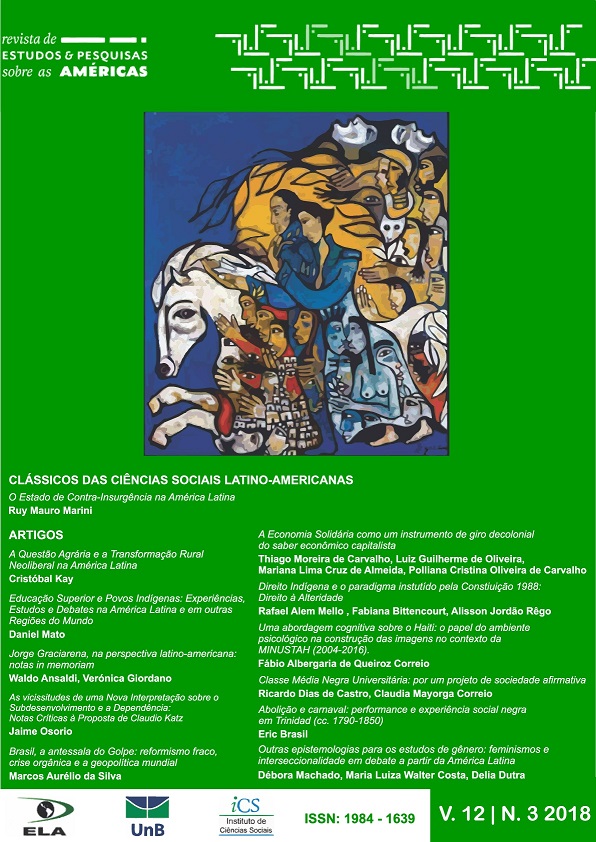Other epistemologies for gender studies: feminisms, intersectionality and the sexual division of labour under debate from Latin America
DOI:
https://doi.org/10.21057/repamv12n3.2018.30554Keywords:
Decolonial feminism. Intersectionality. Sexual division of labor. Gender studiesAbstract
Since its first wave, the feminist movement emerges as a proposal to combat inequalities between men and women, aiming to deconstruct the dominant masculine logic. However, traditional hegemonic feminism, based on the experience of white and bourgeois women, has universalizing and totalizing characteristics that end up disregarding other women. In this context, decolonial feminism emerges as a proposal to review modern concepts connected to traditional hegemonic feminism ”“ thought for a bourgeois white woman ”“ highlighting the concept of intersectionality. Intersectionality is a fundamental point to understand the various positions that women occupy in society, giving visibility to groups that, until now, were not considered in the imaginary of “being woman”. Moreover, intersectionality brings as contribution the fact that sexual division of labor is also racial and based in class. In addition, the concept proposes to social sciences an analysis of the different forms of oppression and ways in which the "colonial wound" is embodied in corps historically situated in particular and local processes. Nevertheless, it is considered important to discuss the criticisms made to the concept and to point out theoretical-methodological challenges regarding its operationalization. As a conclusion, the article elucidates that what exists is, indeed, intersectionalities, that is, categories of articulation varying according to the group and its social, cultural and political context.
Downloads
References
ALONSO, Graciela; DÃAZ, Raúl.. Reflexiones acerca de los aportes de las epistemologias feministas y decoloniales para pensar la investigacíon social. Debates Urgentes”“Dossier: Pensamiento crítico y cambio, v. 1, n. 1, pp. 75-97, 2012.
BALLESTRIN, Luciana.. América Latina e o giro decolonial. Revista Brasileira de Ciência Política, n. 11, pp.89-117, 2013.
BARROSO, J. M.. Feminismo decolonial: una ruptura con la visión hegemónica eurocéntrica, racista y burguesa. Entrevista con Yuderkys Espinosa Miñoso. Iberoamérica Social: revista-red de estudios sociales (III), pp. 22 ”“ 33, 2014. Disponível em: http://iberoamericasocial.com/feminismo-decolonial-una-ruptura-con-la-visionhegemonica-eurocentrica-racista-yburguesa.
BLAZQUEZ-GRAF, Norma.. Epistemología feminista: temas centrales, en: Blázquez, N., Flores, F., & Ríos, M. (coord.), Investigación feminista: epistemología, metodología y representaciones sociales. México, UNAM pp. 21-38, 2012.
BRASIL.. Companhia de Planejamento do Distrito Federal (CODEPLAN), PED - Pesquisa de Emprego e Desemprego, 2016. Disponível em: http://www.codeplan.df.gov.br/component/content/article/261-pesquisassocioeconomicas/258-ped.html. Acesso em nov. de 2017. CASTRO-GÓMEZ, Santiago; GROSFOGUEL, Rámon. (Eds.). El giro decolonial: reflexiones para una diversidad epistémica más allá del capitalismo global. Bogotá: Siglo del Hombre Editores, 2007.
COLLINS, Patricia Hill.. Black feminist thought: Knowledge, consciousness, and the politics of empowerment. Routledge, New York, pp.251-271, 2002.
CORREAL, Diana Marcela Gómez.. Feminismo y modernidad/colonialidad: entre retos de mundos posibles y otras palabras, en: Y. E. Miñoso, D. G. Correal, K. O. Muñoz (eds.), Tejiendo de otro modo: Feminismo, epistemología y apuestas descoloniales en Abya Yala. Colombia, Universidad de Cauca, pp 353-369, 2014.
CRENSHAW, Kimberlé.. Documento para o encontro de especialistas em aspectos da discriminação racial relativos ao gênero. Revista Estudos Feministas, v.10, n.1, 2002, pp. 171-189.
DIEESE, Departamento Intersindical de Estatística e Estudos Socioeconômicos.. O emprego doméstico no Brasil. Estudos e pesquisas, n. 68, 2013, pp. 1-27. Disponível em: https://www.dieese.org.br/estudosetorial/2013/estPesq68empregoDomestico.pdf. Acesso em nov. 2017.
ESCOBAR, Arturo.. “Mundos y conocimientos de otro modo: el programa de investigación modernidad/colonialidad latino-americano”. Tábula Rasa, n.1, 2003, p. 58-86. Disponível em: http://www.redalyc.org/articulo.oa?id=39600104>
FONSECA, Lívia Gimenes Dias da.. Despatriarcalizar e decolonizar o estado brasileiro: um olhar pelas políticas públicas para mulheres indígenas. Tese (Doutorado em Direito), Universidade de Brasília, Brasília, 2016.
G1 Mundo.. Situação de desigualdade das mulheres ameaça desenvolvimento mundial, conclui relatório da ONU, 2017. Disponível em: https://g1.globo.com/mundo/noticia/situacao-de-desigualdade-das-mulheres-ameacadesenvolvimento-mundial-conclui-relatorio-da-onu.ghtml. Acesso em nov. de 2017.
HARDING, Sandra.. “Rethinking Standpoint Epistemology: What is „strong objectivity”Ÿ?”, in S. Harding (ed.), The Feminist Standpoint Theory Reader. Intellectual and Political Controversies. Routledge, New York, 2004, pp. 127-140.
HIRATA, Helena; KERGOART, Danièle.. Novas configurações da divisão sexual do trabalho. Cadernos de Pesquisa, v. 37, n.132, 2007, pp. 595-609.
LUGONES, María.. Hacia un feminismo descolonial. La manzana de la discórdia, v.6, n.2, 2011, pp.105-119.
MAGLIANO, María José.. Interseccionalidad y migraciones: potencialidades y desafíos. Revista Estudos Feministas, v.23, n.3, 2015, pp.691-712.
MENDONZA, Breny. Coloniality of Gender and Power: From Postcoloniality to Decoloniality. Oxford Handbooks Online, 2015. Disponível em: http://www.oxfordhandbooks.com/view/10.1093/oxfordhb/9780199328581.001.0001/o xfordhb-9780199328581-e-6 OIT, Organização Internacional do Trabalho. Quase 20 milhões de pessoas realizam trabalho doméstico remunerado na América Latina, 2013. Disponível em: http://www.oitbrasil.org.br/content/quase-20-milhoes-de-pessoas-realizam-trabalhodomestico-remunerado-na-america-latina. Acesso em dez. de 2017.
PISCITELLI, Adriana.. Interseccionalidades, categorias de articulação e experiências de migrantes brasileiras. Sociedade e cultura, v. 11, n. 2, 2008, pp.263-274.
QUIJANO, Aníbal.. “Colonialidade, Poder, Globalização e Democracia”. Novos Rumos. Ano 17. n. 37, 2002. p. 4-28.
RAGO, Margareth. Epistemologia feminista, gênero e história. Masculino, feminino, plural. Florianópolis, Ed. Mulheres, 1998, pp. 25-37.
SANTOS, Elisabete; NÓBREGA, Lígia.. Ensaio sobre o feminismo marxista socialista. Revista de humanidades, v. 05, n. 11, jul./set, 2004. Disponível em: http://www.cerescaico.ufrn.br/mneme. Acesso em jul. de 2018.
Downloads
Published
How to Cite
Issue
Section
License
The published material is the property of the Journal, and may be reproduced in whole or in part with indication of the source.
Copyright: Authors will be responsible for obtaining the copyright of the material used. Authors who publish in this journal agree to the following terms:
a)Authors retain the copyright and grant the journal the right of first publication, with the work simultaneously licensed under
the Creative Commons Attribution License which allows the sharing of work with acknowledgment of authorship and initial publication in this journal.
b) Authors are authorized to take additional contracts separately, for non-exclusive distribution of the version of the work published in this journal (eg, publish in institutional repository or as a book chapter), with acknowledgment of authorship and initial publication in this journal.
c) Authors are allowed and encouraged to publish and distribute their work online (eg in institutional repositories or on their personal page) at any point before or during the editorial process, as this can generate productive changes as well as increase the impact and the citation of the published work (See The Effect of Free Access).
















